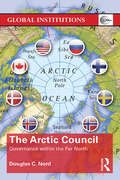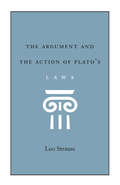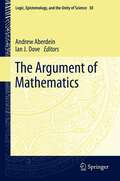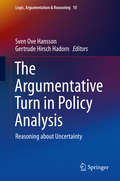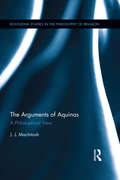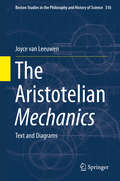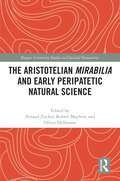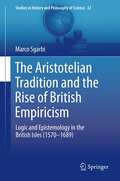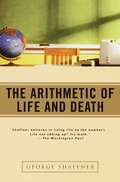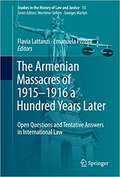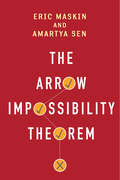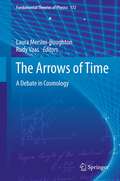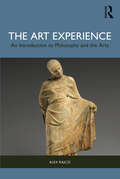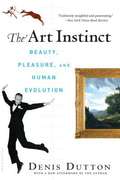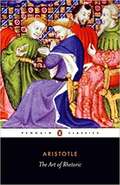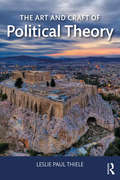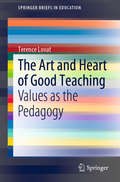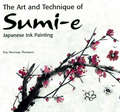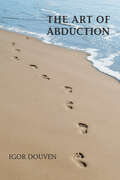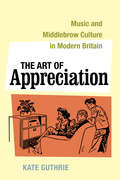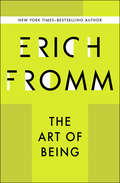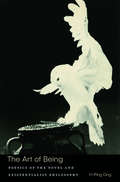- Table View
- List View
The Arctic Council: Governance within the Far North (Global Institutions)
by Douglas C. NordThis book helps us to think carefully about how this area of the world should be best handled in the future by offering a concise and accessible introduction to the Arctic Council. Over the past two decades, the Arctic has evolved from being a remote region in international affairs to becoming an increasingly central concern of the global community. The issues of climate change, access to new energy resources, the development of new global trade routes, the protection of the natural environment and the preservation of indigenous cultures and languages have all come to be focused within this formerly neglected region. Now in its nineteenth year of operation the Arctic Council, an innovative international organization, is going through a period of new growth and challenges. This work identifies the major trends and directions of current Arctic diplomacy and the manner in which national, regional and international leaders and organizations can all make useful contributions in dealing with the complex agenda of environmental, economic and political challenges faced by this increasingly significant area of the globe. This book will be of great interest to students and scholars of international organizations, international relations and the environment.
The Argument and the Action of Plato's Laws
by Leo StraussThe posthumous publication of The Argument and the Action of Plato's "Laws" was compiled shortly before the death of Leo Strauss in 1973. Strauss offers an insightful and instructive reading through careful probing of Plato's classic text. "Strauss's The Argument and the Action of Plato's 'Laws' reflects his interest in political thought, his dogged method of following the argument of the Laws step by step, and his vigorous defense of this dialogue's integrity in respect to the ideals of the Republic. "—Cross Currents "The unique characteristics of this commentary on the Laws reflect the care and precision which were the marks of Professor Strauss's efforts to understand the complex thoughts of other men. "—Allan D. Nelson, Canadian Journal of Political Science "Thorough and provocative, an important addition to Plato scholarship. "—Library Journal "The major purpose of the commentary is to provide a reading of the dialogue which displays its structural arrangement and the continuity of the argument. "—J. W. Dy, Bibliographical Bulletin of Philosophy "The reader of Strauss's book is indeed guided closely through the whole text. "— M. J. Silverthorne, The Humanities Association Review Leo Strauss (1899-1973) was the Robert Maynard Hutchins Distinguished Service Professor Emeritus of political science at the University of Chicago.
The Argument and the Action of Plato's Laws
by Leo StraussThe posthumous publication of The Argument and the Action of Plato's "Laws" was compiled shortly before the death of Leo Strauss in 1973. Strauss offers an insightful and instructive reading through careful probing of Plato's classic text. "Strauss's The Argument and the Action of Plato's 'Laws' reflects his interest in political thought, his dogged method of following the argument of the Laws step by step, and his vigorous defense of this dialogue's integrity in respect to the ideals of the Republic."—Cross Currents "The unique characteristics of this commentary on the Laws reflect the care and precision which were the marks of Professor Strauss's efforts to understand the complex thoughts of other men."—Allan D. Nelson, Canadian Journal of Political Science "Thorough and provocative, an important addition to Plato scholarship."—Library Journal "The major purpose of the commentary is to provide a reading of the dialogue which displays its structural arrangement and the continuity of the argument."—J. W. Dy, Bibliographical Bulletin of Philosophy "The reader of Strauss's book is indeed guided closely through the whole text."— M. J. Silverthorne, The Humanities Association Review Leo Strauss (1899-1973) was the Robert Maynard Hutchins Distinguished Service Professor Emeritus of political science at the University of Chicago.
The Argument of Mathematics
by Andrew Aberdein Ian J DoveWritten by experts in the field, this volume presents a comprehensive investigation into the relationship between argumentation theory and the philosophy of mathematical practice. Argumentation theory studies reasoning and argument, and especially those aspects not addressed, or not addressed well, by formal deduction. The philosophy of mathematical practice diverges from mainstream philosophy of mathematics in the emphasis it places on what the majority of working mathematicians actually do, rather than on mathematical foundations. The book begins by first challenging the assumption that there is no role for informal logic in mathematics. Next, it details the usefulness of argumentation theory in the understanding of mathematical practice, offering an impressively diverse set of examples, covering the history of mathematics, mathematics education and, perhaps surprisingly, formal proof verification. From there, the book demonstrates that mathematics also offers a valuable testbed for argumentation theory. Coverage concludes by defending attention to mathematical argumentation as the basis for new perspectives on the philosophy of mathematics.
The Argumentative Turn in Policy Analysis
by Sven Ove Hansson Gertrude Hirsch HadornThisbook describes argumentative tools and strategies that can be used to guidepolicy decisions under conditions of great uncertainty. Contributing authorsexplore methods from philosophical analysis and in particular argumentationanalysis, showing how it can be used to systematize discussions about policyissues involving great uncertainty. The first part of the work exploreshow to deal in a systematic way with decision-making when there may be pluralperspectives on the decision problem, along with unknown consequences of whatwe do. Readers will see how argumentation tools can be used for prioritizingamong uncertain dangers, for determining how decisions should be framed, forchoosing a suitable time frame for a decision, and for systematically choosingamong different decision options. Case studies are presented in thesecond part of the book, showing argumentation in practice in the areas ofclimate geoengineering, water governance, synthetic biology, nuclear waste, andfinancial markets. In one example, argumentation analysis is applied toproposals to solve the climate problem with various technological manipulationsof the natural climate system, such as massive dispersion of reflectiveaerosols into the stratosphere. Even after a thorough investigation of such aproposal, doubt remains as to whether all the potential risks have beenidentified. In such discussions, conventional risk analysis does not have muchto contribute since it presupposes that the risks have been identified, whereasthe argumentative approach to uncertainty management can be used to systematizediscussions.
The Arguments of Aquinas: A Philosophical View (Routledge Studies in the Philosophy of Religion)
by J.J. MacIntoshThe Arguments of Aquinas is intended for readers with philosophical interests, who may not be specialists in medieval philosophy. Some think that a medieval saint must be, as such, wrong, dated, and boring; others feel that a saint, any saint, must be right, relevant, and inspirational. Both groups are likely to misread Aquinas, if indeed they read him at all. The works of great philosophers are products of their times, but that does not lessen their value for us. We profit by reading the works of St Thomas in the same interested but critical way that we read the works of our contemporaries. MacIntosh does not hesitated to compare Thomas's arguments with those of later philosophers as well as with those of his contemporaries and earlier philosophers. He chooses topics from a variety of still interesting problem areas: the existence and attributes of God, including God's foreknowledge and human free will, causality and the origin of the universe, time and necessity, human souls, angels, and the problem of evil. Additionally, the volume looks at his views on honesty and lying, and on human sexuality, on which he is, as ever, philosophically interesting whether or not we accept his conclusions.
The Aristotelian Mechanics
by Joyce Van LeeuwenThisbook examines the transmission processes of the Aristotelian Mechanics. It does so to enable readers to appreciate thevalue of the treatise based on solid knowledge of the principles of the text. In addition, the book's critical examination helps clear up many of the currentmisunderstandings about the transmission of the text and the diagrams. The first part of the book sets out the Greek manuscript tradition of the Mechanics, resulting in a newlyestablished stemma codicum that illustrates the affiliations of themanuscripts. This research has led to new insights into the transmission of thetreatise, most importantly, it also demonstrates an urgent need for a new text. A first critical edition of the diagrams contained in the Greek manuscripts ofthe treatise is also presented. These diagrams are not only significant for areconstruction of the text but can also be considered as a commentary on thetext. Diagrams are thus revealed to be a powerful tool in studying processes ofthe transfer and transformation of knowledge. This becomes especially relevantwhen the manuscript diagrams are compared with those in the printed editionsand in commentaries from the early modern period. The final part of the bookshows that these early modern diagrams and images reflect the altered scope ofthe mechanical discipline in the sixteenth century.
The Aristotelian Mirabilia and Early Peripatetic Natural Science (Rutgers University Studies in Classical Humanities)
by Arnaud ZuckerThis is the first volume devoted to the sections of the Aristotelian Mirabilia on natural science, filling a significant gap in the history of the Aristotelian study of nature and especially of animals. The chapters in this volume explore the Mirabilia, or De mirabilibus auscultationibus (On Marvelous Things Heard), and its engagement with the natural sciences. The first two chapters deliver an introduction to this work: one a discussion of the history of the text; the other a discussion of Aristotelian epistemology and methodology, and the role of the Mirabilia in that context. This is followed by eight chapters that, together, are effectively a commentary on those sections of the Mirabilia with close connections to Aristotle’s Historia animalium and to a number of Theophrastus’ scientific treatises. Finally, the volume ends with two chapters on thematic topics connected to natural science running throughout the work, namely color and disease. The Aristotelian Mirabilia and Early Peripatetic Natural Science should prove invaluable to scholars and students interested in the ancient Greek study of nature, ancient philosophy, and Aristotelian science in particular.
The Aristotelian Tradition and the Rise of British Empiricism
by Marco SgarbiOffers an extremely bold, far-reaching, and unsuspected thesis in the history of philosophy: Aristotelianism was a dominant movement of the British philosophical landscape, especially in the field of logic, and it had a long survival. British Aristotelian doctrines were strongly empiricist in nature, both in the theory of knowledge and in scientific method; this character marked and influenced further developments in British philosophy at the end of the century, and eventually gave rise to what we now call British empiricism, which is represented by philosophers such as John Locke, George Berkeley and David Hume. Beyond the apparent and explicit criticism of the old Scholastic and Aristotelian philosophy, which has been very well recognized by the scholarship in the twentieth century and which has contributed to the false notion that early modern philosophy emerged as a reaction to Aristotelianism, the present research examines the continuity, the original developments and the impact of Aristotelian doctrines and terminology in logic and epistemology as the background for the rise of empiricism.Without the Aristotelian tradition, without its doctrines, and without its conceptual elaborations, British empiricism would never have been born. The book emphasizes that philosophy is not defined only by the 'great names', but also by minor authors, who determine the intellectual milieu from which the canonical names emerge. It considers every single published work of logic between the middle of the sixteenth and the end of the seventeenth century, being acquainted with a number of surviving manuscripts and being well-informed about the best existing scholarship in the field.
The Arithmetic of Life and Death
by George ShaffnerWhether you realize it or not, numbers are everywhere--and integral to almost every facet of your life . . . from your next raise in pay to the inevitable rise of inflation, your weekly family budget to your end of the national debt. And as George Shaffner amazingly reveals, there are discerning answers (and a great measure of comfort) in numbers. In The Arithmetic of Life, he applies the basic principles of mathematics--addition, subtraction, multiplication, and division--to some of the most profound and just plain puzzling questions of our time.Illuminated with anecdotes, humor, and insight, each chapter explains a unique part of life that can be understood only through the magic of numbers. Whether it's an unconventional theory on why more things go wrong than right, a simple calculation of how much it will cost you to smoke for a lifetime, why crime (accumulatively) doesn't pay, or a glimpse into the probability of life after death, this enlightening and lucidly reasoned book will forever change the way you think about numbers--and the world around you.From the Trade Paperback edition.
The Armenian Massacres of 1915–1916 a Hundred Years Later: Open Questions And Tentative Answers In International Law (Studies In The History Of Law And Justice #15)
by Flavia Lattanzi Emanuela PistoiaExamines the legal nature and consequences of the Armenian massacres of 1915-1916.<p><p> Deals with various interesting questions of international law raised by the topic.<P> Explores how the massacres and the response to them have affected Turkey’s relations with the European Union.<P>This peer-reviewed book features essays on the Armenian massacres of 1915-1916. It aims to cast light upon the various questions of international law raised by the matter. The answers may help improve international relations in the region. In 1915-1916, roughly a million and a half Armenians were murdered in the territory of the Ottoman Empire, which had been home to them for centuries. Ever since, a dispute between Armenians and Turkey has been ongoing over the qualification of the massacres. The contributors to this volume examine the legal nature and consequences of this event. Their investigation strives to be completely neutral and technical. The essays also look at the broader issue of denial. For instance, in Turkey, public speech on the matter can still trigger criminal prosecution whereas in other European States denial of genocide, war crimes and crimes against humanity is criminalized. However, the European Court of Human Rights views criminal prosecution of denial of the Armenian massacres as unlawful. In addition, one essay considers a state’s obligation to remember by looking at lessons learnt from the Inter-American Court of Human Rights. Another contributor looks at a collective right to remember and some ideas to move forward towards a solution. Moreover, the book explores the way the Armenian massacres have affected the relationship between Turkey and the European Union.
The Arrow Impossibility Theorem
by Amartya Sen Joseph E. Stiglitz Kenneth J. Arrow Eric Maskin Prasanta K. PattanaikKenneth Arrow's pathbreaking "impossibility theorem" was a watershed in the history of welfare economics, voting theory, and collective choice, demonstrating that there is no voting rule that satisfies the four desirable axioms of decisiveness, consensus, nondictatorship, and independence. In this book, Amartya Sen and Eric Maskin explore the implications of Arrow's theorem. Sen considers its ongoing utility, exploring the theorem's value and limitations in relation to recent research on social reasoning, while Maskin discusses how to design a voting rule that gets us closer to the ideal -- given that achieving the ideal is impossible. The volume also contains a contextual introduction by social choice scholar Prasanta K. Pattanaik and commentaries from Joseph E. Stiglitz and Kenneth Arrow himself, as well as essays by Sen and Maskin outlining the mathematical proof and framework behind their assertions.
The Arrow Impossibility Theorem (Kenneth J. Arrow Lecture Series)
by Amartya Sen Eric MaskinKenneth J. Arrow's pathbreaking "impossibility theorem" was a watershed innovation in the history of welfare economics, voting theory, and collective choice, demonstrating that there is no voting rule that satisfies the four desirable axioms of decisiveness, consensus, nondictatorship, and independence. <P><P>In this book Eric Maskin and Amartya Sen explore the implications of Arrow's theorem. Sen considers its ongoing utility, exploring the theorem's value and limitations in relation to recent research on social reasoning, and Maskin discusses how to design a voting rule that gets us closer to the ideal—given the impossibility of achieving the ideal. The volume also contains a contextual introduction by social choice scholar Prasanta K. Pattanaik and commentaries from Joseph E. Stiglitz and Kenneth J. Arrow himself, as well as essays by Maskin, Dasgupta, and Sen outlining the mathematical proof and framework behind their assertions.
The Arrows of Time
by Laura Mersini-Houghton Rudy VaasThe concept of time has fascinated humanity throughout recorded history, and it remains one of the biggest mysteries in science and philosophy. Time is clearly one of the fundamental building blocks of the universe and thus a deeper understanding of nature at a fundamental level also demands a comprehension of time. Furthermore, the origins of the universe are closely intertwined with the puzzle of time: Did time emerge at the Big Bang? Why does the arrow of time 'conspire' with the order of the initial state of the universe? This book addresses many of the most important questions about time: What is time, and is it fundamental or emergent? Why is there such an arrow of time, closely related to the initial state of the universe, and why do the cosmic, thermodynamic and other arrows agree? These issues are discussed here by leading experts, and each offers a new perspective on the debate. Their contributions delve into the most difficult research topic in physics, also describing the latest cutting edge research on the subject. The book also offers readers a comparison between the different outlooks of philosophy, physics and cosmology on the puzzle of time. This volume is intended to be useful for research purposes, but most chapters are also accessible to a more general audience of scientifically educated readers looking for deeper insights.
The Art Experience: An Introduction to Philosophy and the Arts
by Alex RajcziThe Art Experience: An Introduction to Philosophy and the Arts takes readers on an engaging and accessible journey that explores a series of fundamental questions about the nature of art and aesthetic value. The book’s 12 chapters explore three questions: What makes something a work of art? How should we experience art to get the most out of it? Once we understand art, how should we evaluate whether it is good or bad? Philosophical theory is illustrated with concrete examples: the paintings of Frida Kahlo, the music of Johann Sebastian Bach, the masks of the Nso people, and many others. Classic questions are balanced with cutting-edge challenges, such as Linda Nochlin’s work on the exclusion of women from the artistic canon.The Art Experience presupposes no prior knowledge of philosophy or art, and it will be of interest to any reader seeking an accessible and engaging introduction to this field. Along the way, readers learn how philosophical theories can affect our real-world experiences with painting, music, theater, and many other art forms.Key Features Accessible for any college student: assumes no knowledge of philosophy, art theory, or any artistic medium Organizes topics conceptually, rather than historically, allowing students to more easily grasp the core issues themselves rather than tracing their historical evolution Offers readers a large number of contemporary examples and a consistent focus on the way theory can affect people’s real-world experiences with art Explores questions about bias – for example, whether the artistic canon has excluded some groups unfairly and whether definitions of art are Western-biased
The Art Instinct: Beauty, Pleasure, & Human Evolution
by Denis DuttonThe Art Instinct combines two of the most fascinating and contentious disciplines, art and evolutionary science, in a provocative new work that will revolutionize the way art itself is perceived. Aesthetic taste, argues Denis Dutton, is an evolutionary trait, and is shaped by natural selection. It's not, as almost all contemporary art criticism and academic theory would have it, "socially constructed.
The Art Of Rhetoric
by Aristotle Hugh Lawson-TancredWith the emergence of democracy in the city-state of Athens in the years around 460 BC, public speaking became an essential skill for politicians in the Assemblies and Councils - and even for ordinary citizens in the courts of law. In response, the technique of rhetoric rapidly developed, bringing virtuoso performances and a host of practical manuals for the layman. While many of these were little more than collections of debaters' tricks, the Art of Rhetoric held a far deeper purpose. Here Aristotle establishes the methods of informal reasoning, provides the first aesthetic evaluation of prose style and offers detailed observations on character and the emotions. Hugely influential upon later Western culture, the Art of Rhetoric is a fascinating consideration of the force of persuasion and sophistry, and a compelling guide to the principles behind oratorical skill.
The Art and Craft of Political Theory
by Leslie Paul ThieleThe Art and Craft of Political Theory provides a critical overview of the discipline’s core concepts and concerns and highlights its development of critical thinking and practical judgment. The field’s interdisciplinary strengths are deployed to grapple with emerging issues and engage afresh enduring ideals and quandaries. While conventional definitions of key concepts are provided, original and controversial perspectives are also explored, revealing continuity in a tradition of thought while emphasizing its diversity and innovations. The Art and Craft of Political Theory illustrates the analytic and interpretive skills, the moral and philosophic discernment, and the historical knowledge needed to appreciate a tradition of thought, to contest its claims, and to make good use of its insights. Topics include: science, ideology and normative theory biology, culture, human nature, power and violence ancient, modern and postmodern political thought liberty, equality, justice, reason and democracy racial, religious, gender and economic identities liberalism, socialism, capitalism, communism, anarchism, feminism and environmentalism social media, automation, artificial intelligence and other emerging technologies. This concise, lively and accessibly written book is essential reading for all students of political theory.
The Art and Heart of Good Teaching: Values as the Pedagogy (SpringerBriefs in Education)
by Terence LovatThis book summarizes and updates findings from the Australian Values Education Program with a focus on the latest international research in the field, both theoretical and practice-based. Further, it provides a theoretical and practical basis for understanding the disenchantment with low-level accountability approaches to learning (e.g. NAPLAN in Australia). In turn, the book demonstrates the effectiveness of Values Education as a holistic pedagogy with the potential to enhance students’ learning effects in terms of their personal, social, emotional and academic development. It offers well-tested alternative pedagogical approaches, based on research insights largely originating from actual classroom-based practice.
The Art and Technique of Sumi-e Japanese Ink Painting
by Kay Morrissey ThompsonThe art of sumi-e, which literally means "ink picture," combines calligraphy and ink-painting to produce compositions of rare beauty. This beauty is paradoxical-ancient but modern, simple but complex, bold but subdued-no doubt reflecting the arts spiritual basis in Zen Buddhism. At the same time sumi-e is firmly rooted in the natural world, its various techniques serving as the painter's language for describing the wonders of nature.Art and Technique of Sumi-e Japanese Ink-Painting explores this ancient technique. Buddhist priests brought the ink stick and the bamboo-handled brush to Japan from China in the sixth century, and over the past fourteen centuries Japan has developed a rich heritage of ink-painting. Today the artistry of sumi-e can be admired in books, reproductions and museums, but the techniques of the art have been much less accessible. As a result, little information has been available to the inquisitive Western artist attracted to ink-painting. This book, designed to help remedy that deficiency, is the product of the author's study with her teacher, Ukai Uchiyama, master calligraphist and artist.
The Art and Thought of Heraclitus
by Charles H. KahnBehind the superficial obscurity of what fragments we have of Heraclitus' thought, Professor Kahn claims that it is possible to detect a systematic view of human existence, a theory of language which sees ambiguity as a device for the expression of multiple meaning, and a vision of human life and death within the larger order of nature. The fragments are presented here in a readable order; translation and commentary aim to make accessible the power and originality of a systematic thinker and a great master of artistic prose. The commentary locates Heraclitus within the tradition of early Greek thought, but stresses the importance of his ideas for topical theories of language, literature and philosophy.
The Art of Abduction
by Igor DouvenA novel defense of abduction, one of the main forms of nondeductive reasoning.With this book, Igor Douven offers the first comprehensive defense of abduction, a form of nondeductive reasoning. Abductive reasoning, which is guided by explanatory considerations, has been under normative pressure since the advent of Bayesian approaches to rationality. Douven argues that, although it deviates from Bayesian tenets, abduction is nonetheless rational. Drawing on scientific results, in particular those from reasoning research, and using computer simulations, Douven addresses the main critiques of abduction. He shows that versions of abduction can perform better than the currently popular Bayesian approaches—and can even do the sort of heavy lifting that philosophers have hoped it would do. Douven examines abduction in detail, comparing it to other modes of inference, explaining its historical roots, discussing various definitions of abduction given in the philosophical literature, and addressing the problem of underdetermination. He looks at reasoning research that investigates how judgments of explanation quality affect people&’s beliefs and especially their changes of belief. He considers the two main objections to abduction, the dynamic Dutch book argument, and the inaccuracy-minimization argument, and then gives abduction a positive grounding, using agent-based models to show the superiority of abduction in some contexts. Finally, he puts abduction to work in a well-known underdetermination argument, the argument for skepticism regarding the external world.
The Art of Appreciation: Music and Middlebrow Culture in Modern Britain (California Studies in 20th-Century Music #30)
by Kate GuthrieFrom the BBC Proms to Bernstein's Young People's Concerts, initiatives to promote classical music have been a pervasive feature of twentieth-century musical life. The goal of these initiatives was rarely just to reach a larger and more diverse audience but to teach a particular way of listening that would help the public "appreciate" music. This book examines for the first time how and why music appreciation has had such a defining and long-lasting impact—well beyond its roots in late-Victorian liberalism. It traces the networks of music educators, philanthropists, policy makers, critics, composers, and musicians who, rather than resisting new mass media, sought to harness their pedagogic potential. The book explores how listening became embroiled in a nexus of modern problems around citizenship, leisure, and education. In so doing, it ultimately reveals how a new cultural milieu—the middlebrow—emerged at the heart of Britain's experience of modernity.
The Art of Being
by Erich FrommA guide to well-being from the renowned social psychologist and New York Times–bestselling author of The Art of Loving and Escape from Freedom. Though laptops, smartphones, and TVs have in many ways made life more convenient, they have also disconnected us from the real world. Days are spent going from screen to machine, machine to screen. In The Art of Being, renowned humanist philosopher and psychoanalyst Erich Fromm draws from sources as varied as Sigmund Freud, Buddha, and Karl Marx to find a new, centered path to self-knowledge and well-being. In order to truly live, Fromm argues, we must first understand our purpose, and the places where we lost it. This ebook features an illustrated biography of Erich Fromm including rare images and never-before-seen documents from the author&’s estate.
The Art of Being: Poetics of the Novel and Existentialists Philosophy
by Yi-Ping OngIn this account of how the novel reorients philosophy toward the meaning of existence, Yi-Ping Ong shows that the existentialists discovered a radical way of thinking about the relation between the form of the novel and the nature of self-knowledge, freedom, and the world. At stake are the conditions under which knowledge of existence is possible.
